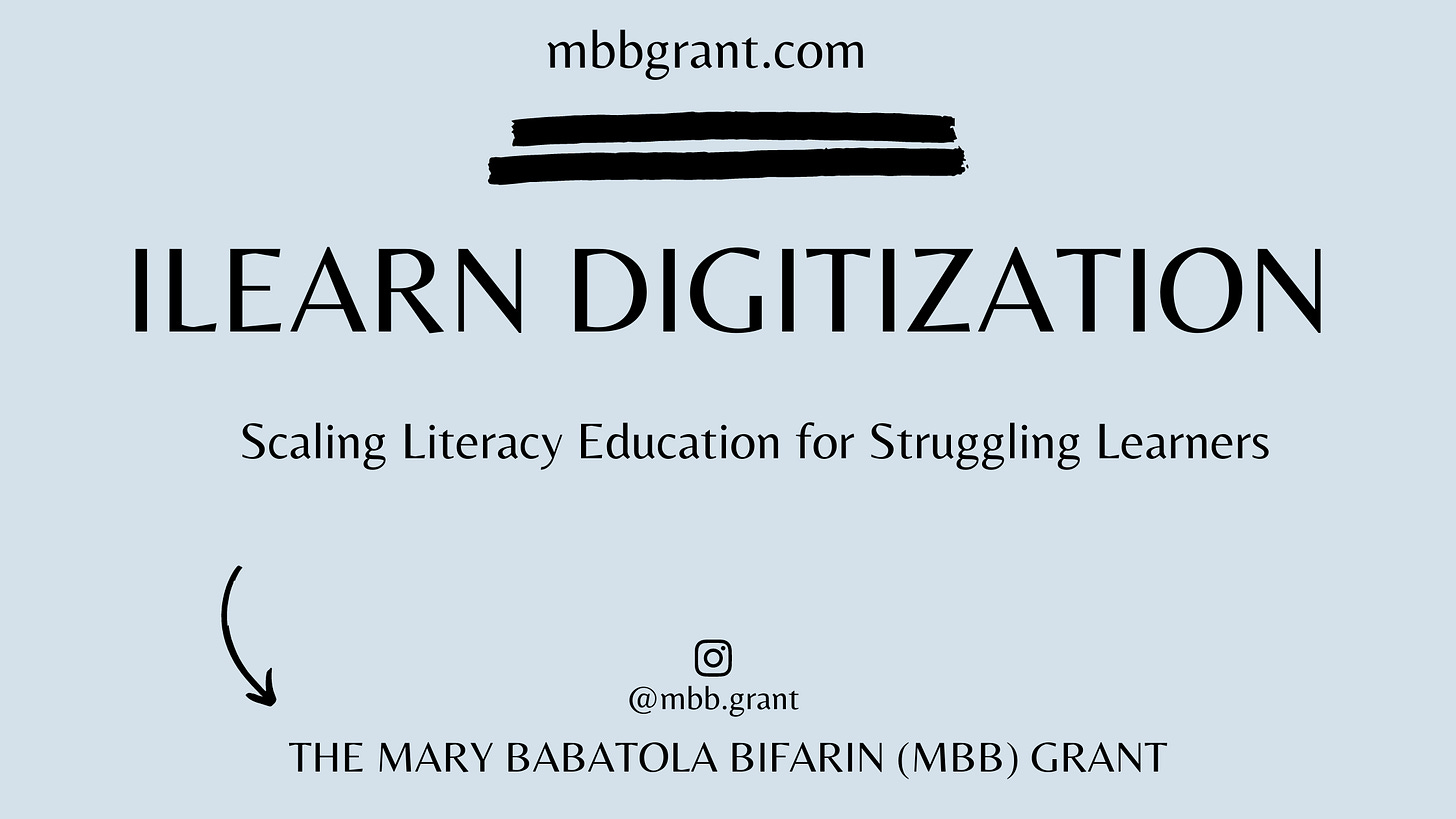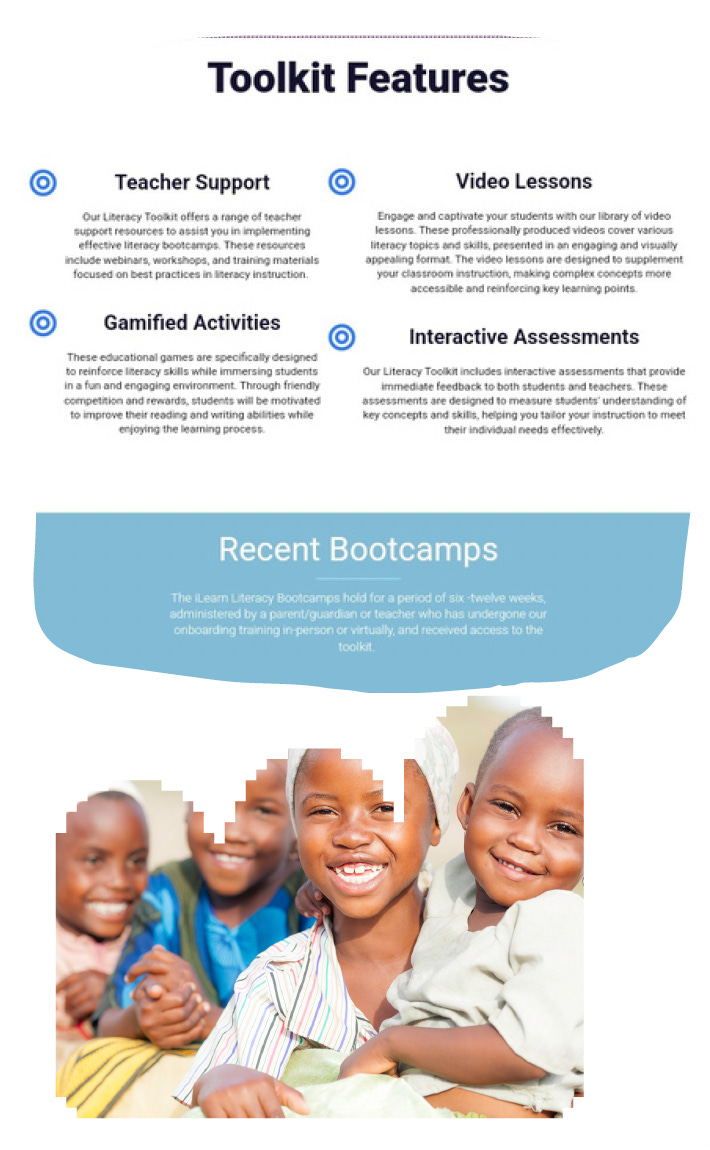This article was written by Patricia Uma a grantee in the Mary Babatola Bifarin Grant Cohort 2 for her project on Scaling Literacy Education for Struggling Learners. I would like to extend my thanks to the donors and the judges that assisted for the second cohort of the MBB grant.
I am delighted to present this project completion report for the digitization of RABNI's iLearn Literacy Toolkit, made possible by the generous support of the Mary Babatola Bifarin Grant. This report highlights the successful completion of the project, the significant impact of the digitization process, and our future plans for scaling the program through technology. For example, via the USAID Opportunities to Learn (OTL) activity for the Northeast, the toolkit will be piloted in Borno, Yobe, and Adamawa states in the coming months.
Project Overview
RABNI received grant money to digitize the iLearn Literacy Toolkit. The primary objective of the project was to convert the existing six-week bootcamp lessons into videos, thereby enhancing accessibility and reducing costs for students across Nigeria. The project also aimed to empower teachers in low-resource settings to implement the bootcamps without requiring RABNI's physical presence.
Project Milestones
The digitization process involved several key steps and milestones, which were successfully accomplished within the project timeline.
- Recording Sessions (Video & Audio)
Professional instructors conducted recording sessions of the iLearn Literacy Toolkit lessons. These sessions ensured high-quality content capture and adherence to pedagogical standards.
- Video Editing
The recorded lessons underwent meticulous editing to enhance their visual appeal and optimize engagement for the target audience. The editing process included refining the audio, enhancing visuals, and adding subtitles for better comprehension.
- Graphical Design of Interactive PDF Templates
The assessments within the iLearn Literacy Toolkit were transformed into interactive PDF templates. This graphical design not only improved the user experience but also facilitated self-assessment and progress tracking for students.
- Website Development
A domain name was purchased, and a hosting plan was established to support the deployment of the digitized iLearn Literacy Toolkit. A professional web designer was engaged to create a user- friendly interface, ensuring seamless navigation and accessibility or students and teachers.
Toolkit Interface
Actual screenshots of the iLearn Literacy Toolkit online platform
https://ilearnliteracyproject.online
Please try a different device, browser and possibly clear cache on your browser if you get the security warning on visiting this page. We are actively working to resolve the issue. Thank you.
Toolkit’s Key Features
- Hosts all lessons of the iLearn Literacy Toolkit
- Hosts all class activities and assessment materials for easy download.
- Contains all teacher support resources to successfully implement the bootcamp.
- Provides answers to Frequently Asked Questions
Impact of Digitization
The digitization of the iLearn Literacy Toolkit has had a profound impact on the delivery of education and literacy development across Nigeria. Some of the notable outcomes and benefits include:
Improved Access: By converting the bootcamp lessons into videos, we have significantly increased accessibility to the iLearn Literacy Toolkit. Students, regardless of their geographical locations can benefit from the program.
Affordability: the infusion of technology has led to a reduction in the overall costs of implementing literacy bootcamps, making it more affordable to implement for communities with low resources settings.
Empowered teachers: The digitization process has empowered teachers in low-resource settings to implement the iLearn Literacy Toolkit without the physical presence of RABNI. Teachers can access all videos, interactive assessments and other resources to conduct literacy bootcamps independently.
Key Achievements
We are thrilled to share that the digitized iLearn Literacy Toolkit has already emerged as one of the top six Edtech solutions in the USAID Opportunities to Learn (OTL) activity for the Northeast in partnership with the North East Innovation Hub. This recognition is a testament to the impact and potential of the toolkit.
Building upon this achievement, we are pleased to inform you that the toolkit will be piloted in Borno, Yobe, and Adamawa states in the coming months. This pilot initiatives will further validate the scalability and impact of the digitized toolkit, enabling us to reach even more students and teachers in the region.
Future Plans
Through this platform, we are launching our 7-year goal of reaching 1,000,000 children across Africa through the iLearn Literacy Toolkit. Tagged "Unlocking 1,000,000 Dreams," this vision aims to empower teachers across Africa with the toolkit, enabling them to successfully run independent literacy bootcamps. We firmly believe that with the ability to read, children can unlock their full potential and fulfil their dreams.
Conclusion
The digitization of RABNI's iLearn Literacy Toolkit has been successfully completed, we express our deepest gratitude to the Mary Babatola Bifarin (MBB) Grant program organizers for the opportunity. Your contribution has played a vital role in transforming the lives of countless students and teachers, empowering them to acquire essential literacy skills.
We look forward to your continued partnership in our journey towards achieving equitable access to quality education and unlocking the dreams of one million children across Africa.






